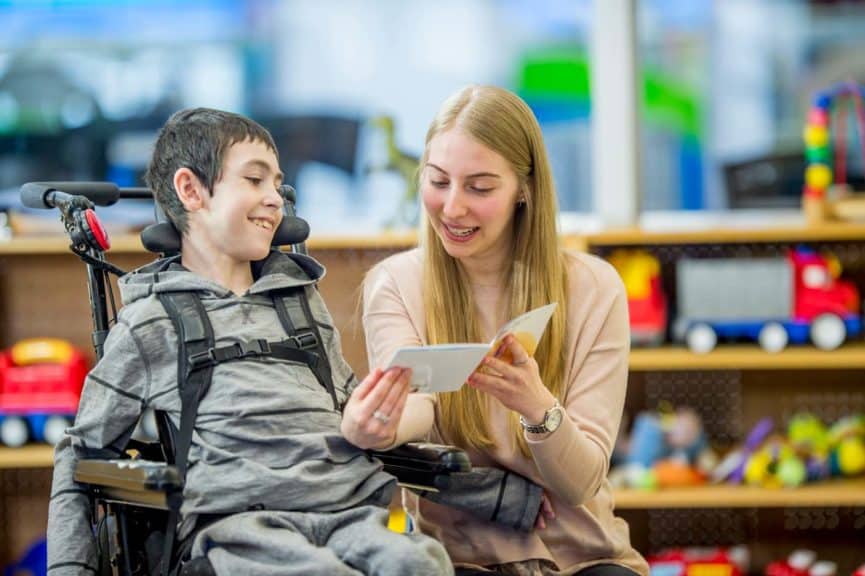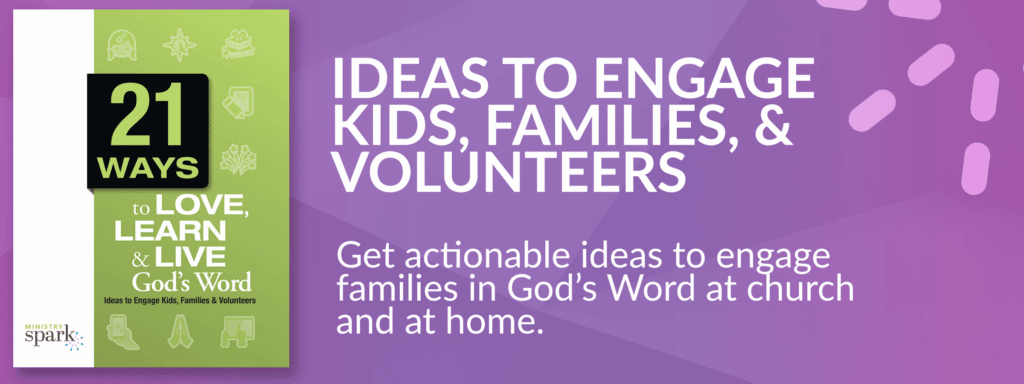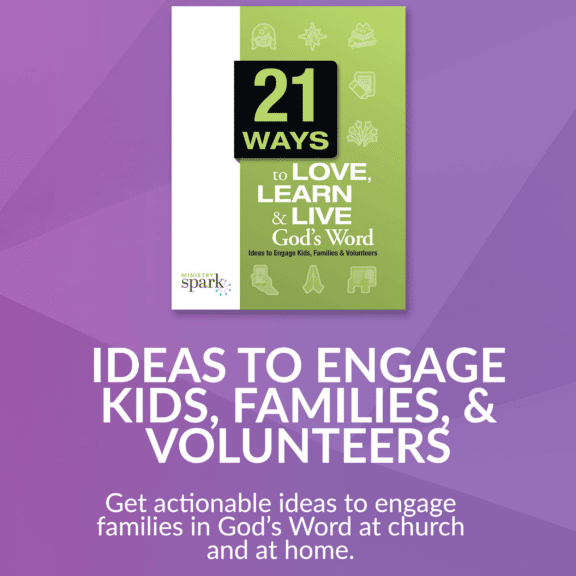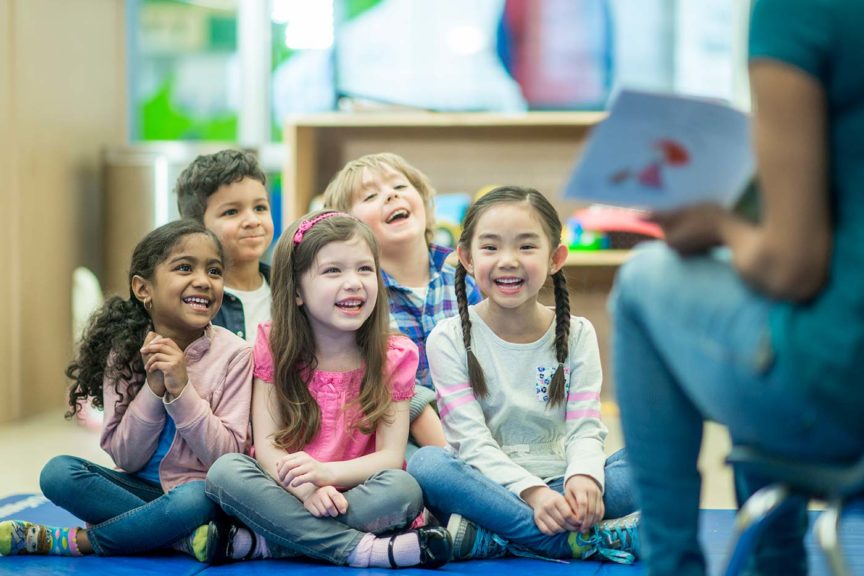THE BASICS FOR LEADERS
Supplies
How many times do we need to forgive someone? How many times? Seventy times seven—that was Jesus’ reply.
That wasn’t a literal answer. We know that 490 times isn’t the cutoff point for grace. Jesus was making the point that forgiveness needs to be available until it’s no longer sought or needed.
But there’s another message in this story: forgiveness is a two-way street. Yes, we receive it from God through Jesus. But we’re also expected to be just as forgiving to others.
In this session you’ll help kids discover that the forgiveness they receive from God isn’t just for them. God wants to empower us to be equally forgiving, to pass along what we’ve received. With his help, we can forgive others!
OPENING ACTIVITY
Option 1: Howzitgoin’
Supplies
- Pencils
- Prepared poster
Before kids arrive, draw a line on a poster. Place a 1 on the left end of the line, a 10 on the right, and a 5 in the middle. As kids arrive, ask them to pencil in their initials on the line.
Say: If this past week was so awful you wish you’d slept through it, place your initials by the 1. If it was a great week you wish you could repeat, put your initials by the 10. Place your initials anywhere on the line that shows how you feel about this past week—except exactly on the 5. That’s because there’s no such thing as a week that’s exactly half good and half bad!
After kids have signed in, give them 30 seconds each to explain why they placed their initials where they did. Be sure to include your own initials and explain your placement on the line. Kids will begin to express themselves more over time—and hearing their stories will help you adapt this lesson to make it relevant to your kids’ lives.
Option 2: Story Sacks
Supplies
- Paper lunch sacks
- Markers
- Yarn
- Glitter
- Glue
- Felt (optional)
Kids will use these puppets later, so be sure everyone makes one. Before the activity, you may wish to make a puppet as a sample. Also refer to the illustration.
Ask kids to sit in a circle on the floor, and join them. Give each child a sack. Provide markers.
Say: Today we’ll dive into a story Jesus told about a man who got into big trouble. He owed lots of money! You’re going to play a part in the story, so you each need to create a sack puppet that looks like you.
If children aren’t sure where to start, show them the illustration or your sample, if you made one. (If you’re feeling especially crafty and have extra time, provide the optional supplies so kids can make more elaborate puppets.) Tell children they should keep their work hidden for now. They have just five minutes to create their masterpieces. Give a two- and one-minute countdown.
Once children have finished, collect the puppets and place them behind you, as you remain seated with the children on the floor.
Say: Now let’s see how much these puppets look like their creators. I’ll show one puppet at a time. See if you can guess who it is.
After the guessing is finished, say: Great job! Set the puppets aside.
Say: Today we’ll talk about forgiveness—about being forgiven by God and about forgiving others who do things to us. They’re connected! God forgives us—so let’s forgive others.

COOL STORY GAME
Gone and Forgotten
Supplies
- Bible
- Dish towel
- Watch with a second hand
- Baking pan
- Variety of 30 or more objects from the junk drawer (buttons, nuts, bolts, nails, coins, beads)
Teach
Place the 30 objects in the pan, and cover them with the dish towel.
Gather children around the pan. Remove the towel and tell kids to look at the items in the pan and memorize them-—in 30 seconds.
Then pick up the pan and turn your back on the kids. Remove one item— without letting them see it—and hide it in a pocket or somewhere else.
Rearrange the remaining items. Turn back to the children, and let them guess which item you removed. No hints!
Play several rounds. Then reveal and replace the missing items. Ask:
- What made it easy or difficult to remember all the items?
- When have you forgotten something you needed to remember? What happened as a result?
- What’s something you think you’d like to forget?
Say: Our memories can play tricks on us. Things we want to remember, we sometimes forget. Things we’d rather forget, we sometimes remember. But here’s something that’s true: everybody forgets things . . . including God. That’s right: God sometimes forgets things.
Read aloud Hebrews 10:17.
Continue: Once God forgives us for something, he chooses not to recall it, not to not bring it up again. And here’s where things get hard: God wants us to forgive people in just the same way.
Read aloud Luke 11:1-4a.
Say: Notice the “forgive us as we forgive others” line. That means us. We are to forgive others as we want Jesus to forgive us. God forgives us—let’s forgive others!
COOL BIBLE STORY
The Not-So-Smart Servant
Supplies
- Bible
- Sack puppets from Opening Activity—Option 2
Assign the following roles to individual kids: king, king’s servant, the servant’s wife and children, and a second servant. (If you have more kids than roles, let them be extra children in the first servant’s family.)
Say: As I read aloud the story Jesus told, use your puppets to act out what happened to your characters. Feel free to move about. If your puppet is supposed to be afraid, shake in fear. If you’re supposed to attack another character, gently go after that puppet. Your puppet has to do the acting—you’re just along for the ride. And though there’s no talking, please whimper, snort, or provide other sound effects as you wish.
Read aloud Matthew 18:21-35, pausing often for the puppets to act out their roles.
When you’re done, have puppets take a bow. Collect them to send home later. Ask children to each sit facing a partner and discuss:
- What’s the lesson about forgiveness that Jesus is trying to teach?
- If Jesus is serious about that message, what does that mean to me?
After kids finish talking, have them circle up with you. Ask what kids think the moral of the story is. Are they on target? Congratulate the children. Are they off target? Gently redirect your children.
Say: Forgiveness is a two-way thing. Yes, God will forgive us if we ask. But we’re expected to be just as forgiving. In that way we begin to show other people what God is like. God is forgiving–let’s be forgiving too!
CLOSING PRAYER
Confession Is Good for the Soul
Read 1 John 1:8, 9 aloud. Say: God forgives, but he wants something from us when he forgives: he wants us to agree with him that what we did is wrong. That’s called “confession.” It’s agreeing with God that the wrong thing we did is wrong.
We’re going to confess to God and trust him to keep his word about forgiving us. We won’t confess out loud here—though it’s OK to do that sometimes. For now, please confess in your head and heart. I’ll lead us.
Ask children to bow their heads and close their eyes. Tell them that they can add their own silent prayers in the pauses.
Pray: Dear God, we trust that you keep your promises. We trust that if we confess, you will be faithful and just to forgive us our sins and to cleanse us from all wickedness.
Please hear us as we tell you about thoughts we have that don’t honor you. This includes our thoughts about people (pause) and our thoughts about the lives you’ve given us. (pause) It also includes our thoughts about you and how important we make you in our lives. (pause)
Forgive us for things we’ve done and for things that nobody knows about except us—and you. (pause)
Forgive things we’ve said, including angry words (pause) and unfair words. (pause) Forgive us for words that have harmed others (pause) and words that don’t honor you. (pause)
We confess that all these things are sin. They don’t please you, and we want to please you. They don’t show you love, and we want to love you. Help us be as forgiving of others. Bring to mind one person we need to forgive. (pause)
Thank you for your forgiveness. Amen.


EXTRA-TIME ACTIVITY
Option 1: You’ve Got Mail
Supplies
- 1 sheet of paper and 1 pencil per child
Ask kids to sit on the floor. Give each child a sheet of paper and pencil.
Say: We all have at least one person we could ask forgiveness from. Who is your person? Is that person someone at home or at school? Think about it for a moment and pick a person . . . and a reason you need to ask for forgiveness.
Pause for a few moments so children have time to think.
Say: Now you get the chance to apologize—at least to practice apologizing. In the next few minutes write a note asking the person to forgive you. And be specific—mention what you did or said that needs to be forgiven.
If you’d rather draw your apology, make a “Please Forgive Me” card. Draw a frown on the cover and a smile on the inside or decorate your card in another way.
Help young children write: “I’m sorry . . . please forgive me” on the insides of their cards.
Explain that kids don’t have to give their notes and cards to the people they’ve wronged. This is just practice. But suggest that if children want to act but don’t want to deliver notes and cards, they can simply talk to the people they’ve wronged and ask for their forgiveness.
Allow time to write or draw. Then have children find partners and discuss:
- What’s hard about asking for forgiveness?
- What would be a good thing about asking for forgiveness?
- How does forgiving someone bring us closer to God?

Option 2: Got It, Give It
Supplies
- Watch with a second hand
- 1 shoe
Ask children to sit in a circle. Invite a child to provide one shoe, or use yours. Choose a child who counts well to be the Lap Master, and hand that child the shoe. That child’s job is to keep track of the number of times a shoe makes it around the circle by calling out the lap number as the shoe passes him or her. One time around? One lap. Twice around? Two laps.
The game’s goal is to make as many laps as possible in 60 seconds. Tell kids there are three rules:
- No throwing! The shoe must be passed.
- If the shoe is dropped, the Lap Master subtracts one lap from the total and everyone must say, “It’s forgiven.”
- If someone makes a poor pass—the shoe is fumbled or falls in a player’s lap—the person receiving the shoe says, “It’s forgiven.” No lost lap!
Play three rounds, trying to increase the number of laps each time. At any time you can call “reverse” and send the shoe in the opposite direction.
After playing, discuss as a group:
- How was this game like real life when someone needs forgiveness?
- In what ways does forgiving others make life—or our game—more pleasant?
Say: When we ask God’s forgiveness, he forgives us. He knows that forgiving us helps us be healthier, happier, and closer to him. And we can forgive others as God forgives us!
Option 3: Inquiring Minds Want to Know
Gather kids in a circle. Ask: If God was only as forgiving of you as you are of others, how forgiven would you feel? Why? What can you do to change that?











